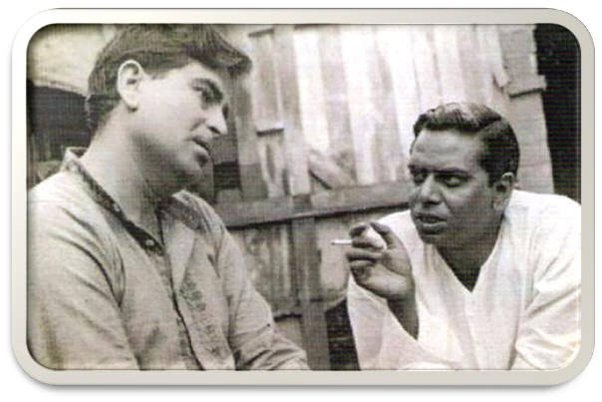SAMAJ WEEKLY UK-
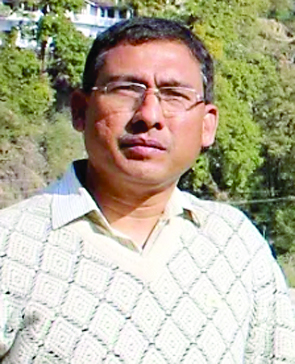
Vidya Bhushan Rawat
Raj Kapoor would have turned 100 today. He passed away in a relatively younger age of 66 but left behind an incredible legacy which is being celebrated widely. Raj Kapoor was perhaps the only actor, director, producer who believed in the power of collective and therefore a celebration of Raj Kapoor should also mean remembering immortal Mukesh, legendry Shailendra and Shankar-Jaikishan. No film maker in India developed that close relationship with his playback singer or lyricist or musician as Raj Kapoor did and to his credit, he acknowledged their role everywhere. In a world, where people never feel shame of ‘intellectual theft’, Raj Kapoor enjoyed his best moments with his ‘creative’ geniuses and they too brought the most enchanting and memorable songs for us. Coincidently, Raj Kapoor’s Kaviraj, who was definitely the greatest of the lyricist that we have seen till date, passed away on December 14th, 1966 at the age of 43. Raj Kapoor had acted in his film ‘Teesari Kasam’ which bombed at the Box office despite getting huge accolade from the critiques. Raj Kapoor was crestfallen hearing the death of Shailendra and always missed his Kaviraj.
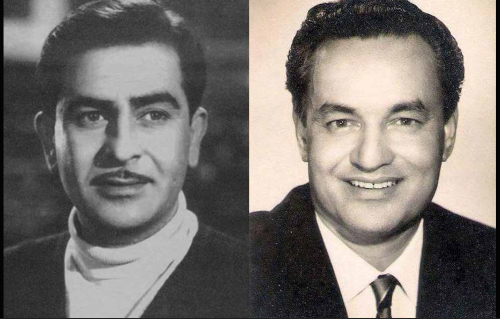 Another person who Raj Kapoor always felt his ‘voice’ and ‘soul’ was another legend, Mukesh whose immoral voice actually gave us the real ‘Raju’ or ‘Raj’, the character that often played on the screen by Raj Kapoor, a simple, innocent and clean hearted commoner. And the third in this category was the music duo Shankar and Jaikishan who gave enchanting music to his films. Together they created magic and mesmerized the people. I don’t find any other parallel in the cinematic world where a star, producer, director has that much of dedication, respect and love for his writers, lyricists and music.
Another person who Raj Kapoor always felt his ‘voice’ and ‘soul’ was another legend, Mukesh whose immoral voice actually gave us the real ‘Raju’ or ‘Raj’, the character that often played on the screen by Raj Kapoor, a simple, innocent and clean hearted commoner. And the third in this category was the music duo Shankar and Jaikishan who gave enchanting music to his films. Together they created magic and mesmerized the people. I don’t find any other parallel in the cinematic world where a star, producer, director has that much of dedication, respect and love for his writers, lyricists and music.
Raj Kapoor started with a film Neel Kamal made by Kedar Sharma but at 24 years of age that time, he ventured into direction in 1948 with film Aag. His costars were Nargis, Premnath, Nigar Sultan and Kamini Kaushal. This film was extremely bold and much ahead of its time. Imagine, an actor, who was not yet established and taking all the risk. The first scene of film Aag is the ‘burnt’ face of the hero whose wife is frightened and shocked on their first night when she sees his face. Raj Kapoor’s contemporaries like Dileep Kumar and Devanand were not ready to take such risk. The film was a great hit and one of the everlasting songs by Mukesh won the heart of the people. It was ‘jinda hoon is tarah ke gam-e-jindagi nahi, jaltaa huaa diyaa hoon magar raushani nahi’.
The next venture of Raj Kapoor was ‘Barsat’ in 1949 which gave us the iconic logo of RK Films which is a popular scene from the film with Raj Kapoor holding a violin in one hand and Nargis on the other. The logo became immortal like Raj Kapoor and Nargis as couples in nearly 12 films. With Barsat, Shailendra, Mukesh and Shankar Jaikishan became like permanent members of RK films along with Nargis and many others.
After Barsat came Awara, one of India’s all-time greats, a classic in true sense. ‘Awara hoon’ became a rage not merely in India but internationally. The lyrics by Shailendra and golden voice of Mukesh perfectly complimented Raj Kapoor vision. The film had a powerful story which try to debunk the myths in the society that the children of the ‘criminals’ would always become criminal. It powerfully exposes those myths which punish children for the ‘sins’ of their parents or elders.
Awara was a grandeur. The cinematography was stunning even when the camera in those years definitely were far inferior but ultimately it is the vision. The dream sequence of ‘ Ghar aaya mera Pardesi’ remain supremely imaginative and so much symbolic that subsequently no film maker could do a repeat of the same. Raj Kapoor and Nargis became the ultimate of romance, absolutely innocent and in the lap of nature. It never seemed that they were merely acting but looked perfectly real-life couple. I am not sure; we ever heard a moonlight romance before Raj Kapoor. You can see his unforgettable romance with Nargis in ‘Dam Bhar Udhar munh phere, oh chandaa aaaaa, main unse pyaar kar lunga, Nazare to char kar lungaa’ or ‘aaja sanam Madhur Chandni me ham, tum mile to veerane me bhi aa jayegi bahar in Chori Chori. Raj Kapoor and Nargis made another supremely beautiful song in the same film with ‘Ye raat bheegi bheegi, ye mast fizaayen, uthaa Dheere Dheere, wo chaand payara pyaara’. One can not but fall in love with their ‘pyaar hua ikrar hua hai, pyaar se fir kyon darta hai dil’.
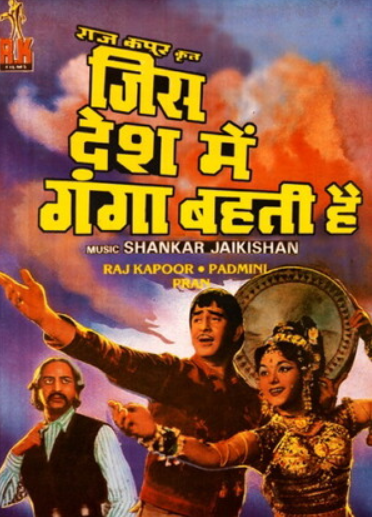 Raj Kapoor’s next huge hit was ‘Jis Desh me Ganga Bahti hai’ in 1960. It was a film based on the dacoit issue of Chambal who surrendered following the efforts of the Gandhian-Sarvodayi activists led by Acharya Vinoba Bhave. In terms of music and sets, it straight forward went into our heart. The film begins with Raj playing his Dafli on a boat in the river Ganga…. ‘Mera naam Raju, Gharana Anam, Behti hai Ganga, Jahan meraa dham’. This film too was musical and had a big message for all. Its title song, ‘ Hum us desh ke waasi hain, jis desh me ganga behti hai’, actually explains us the ‘idea of India’, an India that respect the guests and is inclusive in nature. We might be poor but have big heart. For the first time, Raj Kapoor had Padmini as his lead heroine. Basically, it was the first film beyond Nargis who actually after Mother India, came close to Sunil Dutt and later got married to him. Though this film was made by his Radhu Karmakar, the film in all senses has the stamp of a RK film.
Raj Kapoor’s next huge hit was ‘Jis Desh me Ganga Bahti hai’ in 1960. It was a film based on the dacoit issue of Chambal who surrendered following the efforts of the Gandhian-Sarvodayi activists led by Acharya Vinoba Bhave. In terms of music and sets, it straight forward went into our heart. The film begins with Raj playing his Dafli on a boat in the river Ganga…. ‘Mera naam Raju, Gharana Anam, Behti hai Ganga, Jahan meraa dham’. This film too was musical and had a big message for all. Its title song, ‘ Hum us desh ke waasi hain, jis desh me ganga behti hai’, actually explains us the ‘idea of India’, an India that respect the guests and is inclusive in nature. We might be poor but have big heart. For the first time, Raj Kapoor had Padmini as his lead heroine. Basically, it was the first film beyond Nargis who actually after Mother India, came close to Sunil Dutt and later got married to him. Though this film was made by his Radhu Karmakar, the film in all senses has the stamp of a RK film.
Later Raj Kapoor ventured into the colour film production and came with Sangam. Along with his close friend Rajendra Kumar, the lead heroine was Vaijyantimala. The film was a super hit with beautiful lyrics like ‘ Dost Dost na raha, pyaar pyaar na raha’ or har dil jo pyaar karega, wo ganaa gayega. The stunning performance of Raj Kapoor singing ‘ Dost Dost na rahaa, pyaar pyaar na raha’ still remembered by all. Two other songs which became super hit were, ‘ Ye meraa prem patra padh kar, ki tum naaraj mat honaa’, and Mere man ki ganga aur tere man kee jamuna kaa, bol radhaa bol sangam hoga ki nahi’.
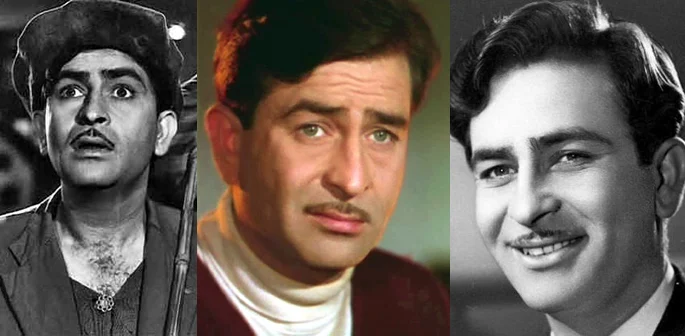 After Sangam, Raj Kapoor created his Magnum opus, ‘ Mera Nam Joker’ which can be termed as his biographical film. The film had huge sets and a big star cast. The songs were superbly filmed and are still some of the most popular songs of our time. ‘ Jane kahan gaye wo din’, or Jeena yahaa marna yaan, iske siwa jaana kahaan, actually narrate the vision of Raj Kapoor and his idealism. This film had two other meaningful songs, one, ‘ ai bhai, jara dekh ke chalo’, sung by Manna Dey and the other rendered by Mukesh, ‘Kahta hai joker, saara jamanaa, aadhi hakikat, aadhaa Fasana’, too became very popular but sadly the film bombed at the Box Office trashing all the dreams of Raj Kapoor that he had with this film. It is sad that Raj Kapoor had mortgaged a large part of his assets to build his dream project but it was rejected by the people. It was a wonderful film and even today, can easily be termed as Raj Kapoor’s one of the greatest. The film worked well in USSR.
After Sangam, Raj Kapoor created his Magnum opus, ‘ Mera Nam Joker’ which can be termed as his biographical film. The film had huge sets and a big star cast. The songs were superbly filmed and are still some of the most popular songs of our time. ‘ Jane kahan gaye wo din’, or Jeena yahaa marna yaan, iske siwa jaana kahaan, actually narrate the vision of Raj Kapoor and his idealism. This film had two other meaningful songs, one, ‘ ai bhai, jara dekh ke chalo’, sung by Manna Dey and the other rendered by Mukesh, ‘Kahta hai joker, saara jamanaa, aadhi hakikat, aadhaa Fasana’, too became very popular but sadly the film bombed at the Box Office trashing all the dreams of Raj Kapoor that he had with this film. It is sad that Raj Kapoor had mortgaged a large part of his assets to build his dream project but it was rejected by the people. It was a wonderful film and even today, can easily be termed as Raj Kapoor’s one of the greatest. The film worked well in USSR.
This rejection of people actually gave Raj Kapoor, a food for thought which he had expressed long back. He realized that as an actor, his time was over and the people want change. Though he acted in many films later but not as the main star but in character roles or special roles. That way, Bobby was a trendsetter in Indian cinema. It became a cult movie and millions of people watched this movie again and again. For the first time, Raj Kapoor actually looked beyond himself, Shankar Jaikishan and Mukesh though the influence of his old friends was always there in this movie. He created a new sensation in the field of playback singing. Shailendra Singh actually became a rage with his beautiful voice, ‘ main shayar to nahi’ or Hum tum ek kamre me band ho, aur chabi kho jaaye.’
Raj Kapoor was often accused of using nudity to promote his films but one can watch these films and see that that there is nothing vulgar in his films. He had always mentioned in many of his interviews that he respected women but his films do justice to the story. His film Prem Rog and Ram Teri Ganga Maili were made on important social and cultural issues. To shoot Ram Teri Ganga Maili, he went to Gangotri and Harsil which would have been really tedious and difficult in those time. He was targeted by critiques for his film ‘ Satyam Shivam Sundaram’ but have a look at films like ‘Dharam-Karam’ or ‘Kal Aaj aur Kal’ and they all provide a great story and crisis of our society.
Remember, Raj Kapoor had three important films between Awara, Shri 420 and Jis Desh me Ganga Behati hai. These three films were: Ab Dilli Door Nahi, Boot Polish and Jagate Raho. Both Boot Polish and Jagte Raho were actually classics and won accolades but did not work on Box Office. Somebody asked him a question as why he did not make film like Boot Polish again and he said, I would turn bald like David in the film.
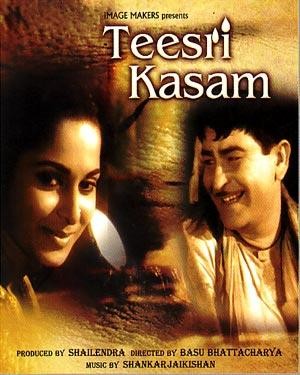 Many of Raj Kapoor’s films that he worked for outside banners were actually his encouragement to his friends and colleagues. His Teesari Kasam was a classic which failed to enthuse the public. His ‘Phir Subah Hogi’ was another classic with stunning lyrics by Sahir and music by Khaiyyam. ‘Wo Subah kabhi to aayegi’ or Asma hai khuda aur jameen pe ham, aaj kal wo is taraf dekhta hai kam simply reflect how Raj Kapoor never need a god to portray the issue of society and its discrimination.
Many of Raj Kapoor’s films that he worked for outside banners were actually his encouragement to his friends and colleagues. His Teesari Kasam was a classic which failed to enthuse the public. His ‘Phir Subah Hogi’ was another classic with stunning lyrics by Sahir and music by Khaiyyam. ‘Wo Subah kabhi to aayegi’ or Asma hai khuda aur jameen pe ham, aaj kal wo is taraf dekhta hai kam simply reflect how Raj Kapoor never need a god to portray the issue of society and its discrimination.
It is important to understand Raj Kapoor in his comprehensiveness. He changed a lot post Mera nam Joker because the film flopped. He realized that the public want something different. A film maker understands the psyche of the people. Even with that, he was able to communicate the message that he wanted to sing. None can say they went to see a Bobby, Satyam Shivam Sundaram, Prem Rog, Ram Teri Ganga Maili to nudity. And there is always a difference between nudity and obscenity.
Raj Kapoor’s contribution to Indian cinema is unparalleled. He nurtured it, gave it new ideas and actually prove that it was not merely entertainment but cinema could be used to promote the socio-political issues. That he was a master craftsman and remained among very few who could mesmerize people with his idealism. Many critiques suggested that Raj Kapoor’s themes of socialism and social justice have lost their relevance but it is absolutely hypocritical to say that. Socialism for Raj Kapoor was not meant to promote a dictatorial government. His ideal socialism was inclusive and in plain term could be said to be Begampura of Raidas. All his team members Khwaja Ahmed Abbas as well as Shailendra have progressive idealism which in those time were associated with the left or workers movement. Raj Kapoor’s film shows those concern of the working society and give people a dream for success. He provided hope to all, to the oppressed, to the depressed or those who are alone, who feel unwanted by the world. He gave them aspiration.
Celebrating Raj kapoor’s birth centenary will give our youth an opportunity to see the kind of cinema he created which raised people’s issues, spoke against social evils and at the same point of time did not compromise with the quality of the films. The quality of his work, the music and the lyrics all made him unparalleled. Two of his most popular songs actually reflect the philosophy of his life. The first one from his most loved film, Mera Naam Joker penned by Shailendra and sung by Mukesh, ‘
‘kal khel me, hum ho na ho,
Gardish me tare rahenge Sada,
Bhulenge who, bhuloge tum,
Par ham tumhare,
Rahenge sadaa,
Rahenge yahi, apne nishaa,
Iske siva jaana kahaan,
Jeena yahaa, marnaa yahaa,
Iske siva jaana kahaa..
And his most loving song that gives us a philosophy of life and only Shailendra could do so by writing an extremely immortal song and equally enchanting was the voice of Mukesh and of course, Raj Kapoor looked so natural and loving. This was the idea of a socialism in true sense what Raj Kapoor felt, what Shailendra thought.
‘ Kisi ke muskurahto pe ho nisaar,
Kisi kaa dard mil sake to le udhar,
Kisi ke vaste ho tere dil me pyaar,
Jeena Isee kaa naam hai.’
Salute to Raj Kapoor and his Kaviraj Shailendra and his soul Mukesh. Today, when we remember Raj Kapoor, let us all remember all these legends including his story writer Khwaja Ahmed Abbas. Our salute to this spirit of socialism and idea of an inclusive India that Raj Kapoor narrated so beautifully through his cinema. They are our treasure-troves and new generation will gain immensely if they find time to go through these classics.


